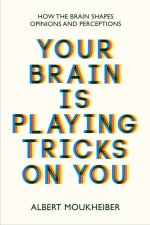
Code: 02718211
Knowledge Structures
by Dietrich Albert, Dietrich Albert, J.-C. Falmagne, J.-P. Doignon
This book is a sign of its times. Each one of the chapters - papers written by European authors of various backgrounds- illustrates a departure from the style of theorizing that has been prominent in the behavioral and social scie ... more
- Language:
 English
English - Binding: Paperback
- Number of pages: 256
Publisher: Springer-Verlag Berlin and Heidelberg GmbH & Co. KG, 1994
- More about this

61.35 €

Low in stock at our supplier
Shipping in 13 - 16 days
Potřebujete více kusů?Máte-li zájem o více kusů, prověřte, prosím, nejprve dostupnost titulu na naši zákaznické podpoře.
Add to wishlist
You might also like
Give this book as a present today
- Order book and choose Gift Order.
- We will send you book gift voucher at once. You can give it out to anyone.
- Book will be send to donee, nothing more to care about.
More about Knowledge Structures
You get 154 loyalty points
 Book synopsis
Book synopsis
This book is a sign of its times. Each one of the chapters - papers written by European authors of various backgrounds- illustrates a departure from the style of theorizing that has been prominent in the behavioral and social sciences for most of the century. Until very recently, models for behavioral phenomena were chi~fly based on numerical representations of the objects of concern, e. g. the subjects and the stimuli under study. This was due in large part to the influence of nineteenth century physics, which played the role of the successful older sister, the one that had to be imitated if one wished to be taken seriously in scientific circles. The mystical belief that there could be science only when the objects of concern were susceptible of measurement in the sense of physics was a credo that could not be violated without risks. Another, more honor able justification was that the numerical models were the only ones capable of feasible calculations. (In fact, these models were typically linear. ) An early example of such theorizing in psychology is factor analysis, which attempted to represent the results of mental tests in a real vector space of small dimen sionality, each subject being represented by a point in that space. A dimension Wa Pds. interpreted as a scale measuring some mental ability. The analysis was simple, and only required an electrical desk calculator (with spinning wheels), and a suitable amount of determination.
 Book details
Book details
Book category Books in English Society & social sciences Psychology Cognition & cognitive psychology
61.35 €
- Full title: Knowledge Structures
- Author: Dietrich Albert, Dietrich Albert, J.-C. Falmagne, J.-P. Doignon
- Language:
 English
English - Binding: Paperback
- Number of pages: 256
- EAN: 9783540576648
- ISBN: 3540576649
- ID: 02718211
- Publisher: Springer-Verlag Berlin and Heidelberg GmbH & Co. KG
- Weight: 751 g
- Dimensions: 297 × 210 × 16 mm
- Date of publishing: 13. September 1994
Trending among others
-

Thinking, Fast and Slow
13.29 € -9 % -

Thinking, Fast and Slow
17.22 € -10 % -

The Art of Thinking Clearly
7.85 € -21 % -

How Emotions Are Made
11.27 € -5 % -

Shadows Of The Mind
15.20 € -28 % -

How We Learn
11.07 € -22 % -

Frames of Mind
20.75 € -19 % -

Gödel, Escher, Bach
21.85 € -15 % -

The Paradox of Choice
13.49 € -19 % -

250 Brief, Creative & Practical Art Therapy Techniques250 Brief, Creative & Practical Art Therapy Techniques
26.69 € -28 % -

Chaos, Creativity, and Cosmic Consciousness
17.92 € -

Multiple Intelligences
22.66 € -

Trauma and Memory
18.43 € -19 % -

Archetypal Imagination
14.50 € -19 % -

Other Minds
10.57 € -32 % -

Love & Will
16.21 € -14 % -

Hare Brain, Tortoise Mind
14.60 € -19 % -

Willpower
12.18 € -22 % -

Marshmallow Test
9.06 € -23 % -

Biggest Bluff
11.07 € -19 % -

Power of Mindful Learning
14 € -24 % -

Creativity
12.69 € -25 % -

Making Of Memory
19.64 € -18 % -

Courage to Create
13.39 € -16 % -

The Memory Illusion
11.38 € -20 % -

Where Good Ideas Come From
12.18 € -22 % -

Getting Started with EEG Neurofeedback
48.05 € -4 % -

Analysis of Daniel Kahneman's Thinking, Fast and Slow
8.05 € -15 % -

Your Brain Is Playing Tricks On You
18.23 € -

WHY WE LOVE
17.02 € -22 % -

Enigma of Reason
12.38 € -21 % -

Geography of Thought
11.98 € -18 % -

Risk Savvy
10.97 € -23 % -

Meme Machine
13.79 € -24 % -

Cognitive Psychology
85.83 € -

Intelligence: A Very Short Introduction
9.16 € -25 % -

Memory: A Very Short Introduction
9.26 € -28 % -

Thinking and Reasoning: A Very Short Introduction
10.57 € -18 % -

Manipulated Mind: Brainwashing, Conditioning, and Indoctrination
13.79 € -19 % -

Natural History of Human Thinking
24.68 € -

Intuition for Starters
17.82 € -

Five Minds for the Future
20.54 € -28 % -

Believing Brain
16.31 € -22 % -

White Bears and Other Unwanted Thoughts
21.75 € -3 % -

Mind in Motion
27.50 € -23 % -

MIRRORING PEOPLE
16.11 € -29 % -

Power of Persuasion
14.50 € -19 % -

Genius Frequency
21.35 € -

Creativity and Madness
36.26 €
Collection points Bratislava a 2642 dalších
Copyright ©2008-24 najlacnejsie-knihy.sk All rights reservedPrivacyCookies





 15549 collection points
15549 collection points Delivery 2.99 €
Delivery 2.99 € 02/210 210 99 (8-15.30h)
02/210 210 99 (8-15.30h)